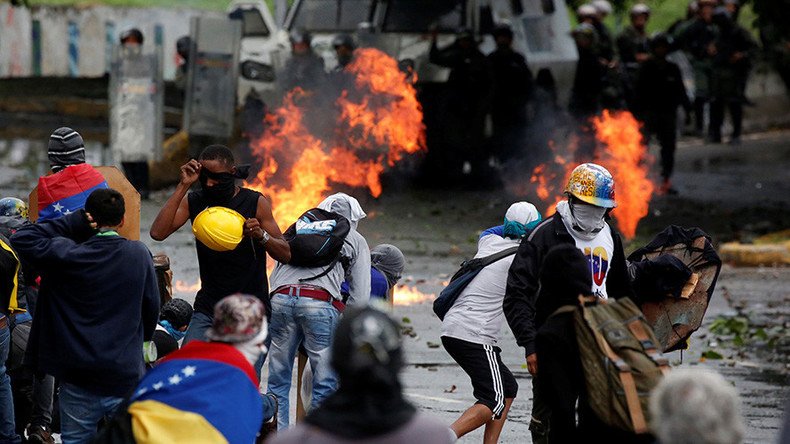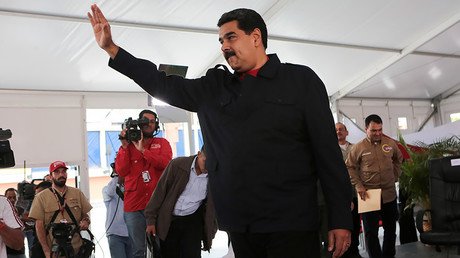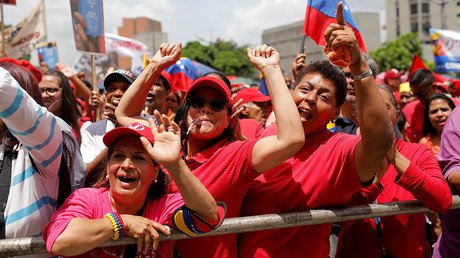Venezuela election: Democratic process or path to ‘unconstitutional’ reform? (VIDEO DEBATE)

Upcoming elections to the Constituent Assembly have split Venezuelan public opinion. While the opposition boycotts the vote, calling the new body unconstitutional, government supporters challenge its decision to abstain.
RT spoke to both ends of the political spectrum to get a closer look at the situation in Venezuela just one day ahead of the elections to the Constituent Assembly. The body’s task is to revise the current constitution. The popular vote for 364 members of the new body – with 181 other representatives to be chosen by members of seven social sectors – is the solution to the existing political crisis on the country, according to President Maduro.
On the other hand, the opposition forces, who have a majority in the country’s parliament, the National Assembly, believe that the move has nothing to do with democracy.
Speaking to RT, a former Venezuelan permanent representative to the UN and prominent opposition figure, Diego Aria, said the vote is aimed at overriding the opposition-controlled parliament by the “unconstitutional” elections.
“The purpose is not only to write the constitution, the purpose is to get rid of the National Assembly, which we won with two-thirds of the votes,” Aria told RT.
“This is not a democratic election. According to our constitution, we have only one way you can call Constituent Assembly – after you have uninominal votes. What the government has done, they have chosen a group of people around the country of their own people to present themselves a vote,” he added.
This, Aria believes, could lead to a repeat of “the Cuban model” in Venezuela.
“I believe that after the election Sunday, which is to replicate the Cuban model, shortly afterwards the National Assembly, where we have two-thirds of the votes, we’ll be eliminated. I think we’ll go to the Cuban system. Eventually we will not have any more elections in Venezuela.”
Meanwhile, a co-writer of ‘The Empire Files’ TV program and political activist, Mike Prysner, argued that the opposition had every chance to participate in the democratic process, but chose the abstain from it and trigger violence instead.
“It’s an open democratic process and the opposition can run their own candidates, and they can participate in it… If they have a majority as they say they do [in the National Assembly], take it easily, run, take the majority of the constituents and shape the constitution. Instead, they’ve opposed a democratic process and called for violence in the streets in response,” Prysner stated.
The activist also spoke on what he sees as American meddling in Venezuelan domestic affairs. The same accusation has been repeatedly voiced by President Maduro, who accused Washington of plotting “regime change” in Caracas and aggressive behavior towards the country.
The US wants “to determine the outcome of the political process in Venezuela,” Prysner said. “They have long been funding to the tune of millions and millions of US taxpayer dollars to opposition parties, to opposition movements. No one wants the US intervention. Even members of the opposition that I spoke to do not want the US to intervene.”
Meanwhile, Washington placed 13 Venezuelan government officials on the Treasury Department’s sanctions list for “undermining democracy” on Wednesday. It also called the July 30 elections an “incredible threat to democratic institutions” that can lead to “the end of democracy in Venezuela.”
Venezuela has been riven by violent protests since April, leaving at least 100 people dead and hundreds more wounded. The opposition and the government place the blame on each other. While Prysner said most of the deaths were caused by opposition violence, his opponent refuted the allegations, saying that they are a peaceful opposition.
The statements, views and opinions expressed in this column are solely those of the author and do not necessarily represent those of RT.














